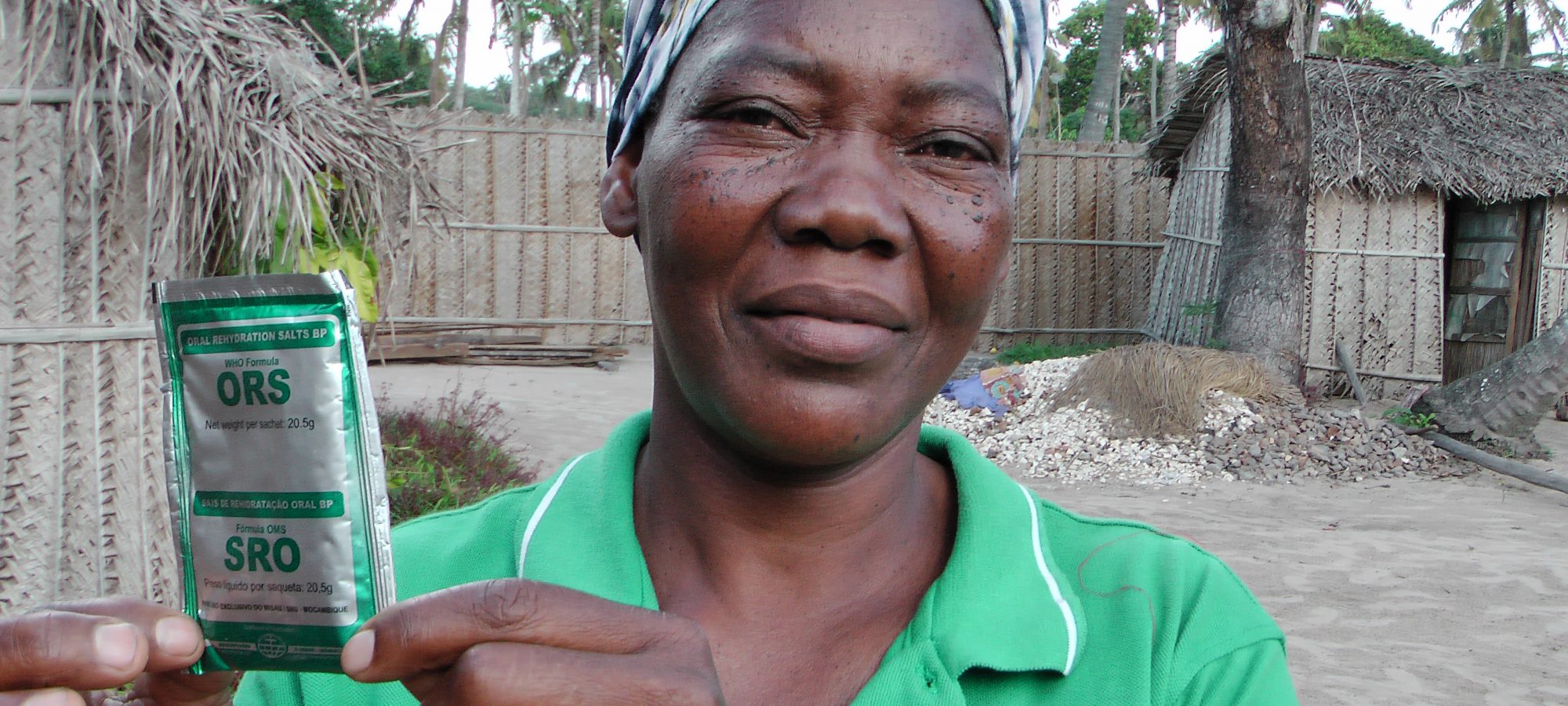Dieterio Magul is a Field Officer for Malaria Consortium’s ICCM (integrated community case management) programme in the Inhambane province of Mozambique. He works with the provincial health authorities to support the community health programme that has been running for over 30 years. Revitalisation of the programme by the Ministry of Health began in 2010, with community health workers, called APEs in Mozambique, trained to diagnose and treat simple forms of the three main childhood diseases: malaria, pneumonia and diarrhoea. Dieterio travelled to Lindela village in Inhambane province, to speak to Arnalda Micas Nhassengo about her experience as an APE working in a rural community.
Arnalda decided early on in her life to dedicate her energies to the well being of the community, despite personal challenges. When she was younger, during the years in which civil war badly affected Mozambique, she became a volunteer health worker.
In 2011, she became an Elementary Multipurpose Agent (APE), or volunteer health worker, through the APE programme. Providing healthcare has always been one of Arnalda’s aims in life. Despite getting older, she remains steady, and full of energy and determination. “Now I am both the husband and wife, because I take care of my children and home, I work in the field and also provide homecare to my community. I am working in a large community which has three villages.”
Being an APE has given her life a new perspective. Every day, Arnalda follows a routine: “I clean my house and go to work in the fields. I feed my family; I have three children. Lately, I have had time to make house calls, which allows me to visit families who do not know how to manage diseases. My role as APE is to use what I learnt in the APE training to inform families how to keep a clean house and how to make latrines which are well covered from above.”
In addition to health promotion for disease prevention, APEs like Arnalda also receive four month training on how to diagnose and treat simple diseases that affect children; malaria, pneumonia and diarrhea. This enables Arnalda to bring health care closer to the home, ensuring access to health care, especially for a community living significant distances away from formal health facilities.
“The training I received has been helpful – it has enhanced my knowledge. Before this I only knew that malaria, tuberculosis and HIV existed. Now I have learned about respiratory diseases. Despite still having difficulties in providing treatment because we don’t have enough medication, we do our best to help people and encourage them to go to the health centre when we cannot provide treatment.”
“I haven’t lost a single child that I have treated for malaria. When a parent brings their child to me, sick and vomiting, or with diarrhoea, I prepare the mixture at that moment and I give it to the child. If I test and confirm that child has malaria, I give the first dose here at my home. Children usually come with a high fever. I have a thermometer to confirm if the temperature is high. If it is, I cool down the child’s body by wrapping the child in a wet cloth. I give the child medication and ask the mother to keep giving the medication until the last day. They then need to come back to tell me if the child is better. Until now, no one has ever told me that a child hasn’t recovered after I treated them. If I transfer the child to a health centre it is because I don’t have the correct and adequate medicine I need to treat that child.”
Arnalda has the necessary skills required to continue working as an APE, as well as motivation and conviction. “I will continue to work as an APE until the end of my life, because I am Mozambican, and I must work for my country.”
Malaria Consortium’s ICCM programme in Mozambique has been supported by the Canadian International Development Agency and the Planet Wheeler Foundation since 2009. Malaria Consortium’s support includes recruitment and training of APEs to diagnose and treat malaria, pneumonia and diarrhoea appropriately; support to national and local health system to provide supervision and monitoring of community-based activities, as well as the implementation of health promotion activities to increase awareness of malaria, pneumonia and diarrhoea management and prevention within the communities.
In addition, through funding from the Bill and Melinda Gates Foundation, Malaria Consortium is conducting research into innovative ways to improve the motivation and performance of APEs. This research initiative, the inSCALE project, aims to inform the expansion of community health worker programs and support these programs to provide access to timely and appropriate treatment for common childhood illnesses worldwide.
